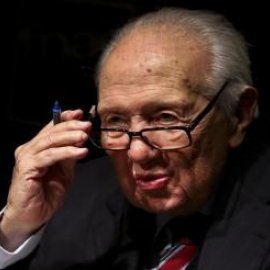Mario Soares: A Tribute for an Ocean Exemplar
-
English
-
ListenPause
I’m Peter Neill, Director of the World Ocean Observatory. Mario Soares, former President of Portugal, socialist, statesman, educator, political prisoner, exile, bibliophile, gourmet, and cultural enthusiast, died this month at the age of 92. Soares was a man of enormous spirit, moral sensibility, verbal persuasiveness, and big ideas. He was a mid-20th century statesman of great imagination, energy, and fervor, although his reputation may have been somewhat limited to Portugal and Europe where he was a continuing political presence long after he left electoral politics. He stood in courageous opposition to the dictatorial rule of Antonio Salazar, was first arrested at age 19, followed by several further arrests, three-years in prison for his opposition to Portuguese colonial occupation, five years in exile, served as opposition in the legislature, led the bloodless “Carnation Revolution” in 1974--civil unrest characterized by flowers place in the gun barrels of the military and police--and, in 1976, was the first popularly elected prime minister, thereafter president, of his country in more than 60 years. What was left out of his NY Times obituary, however, is perhaps his greatest contribution to the 21st century. In 1998, Soares convened two independent groups of experts, scientists and politicians, independent of the United Nations, to address what he believe where the most compelling questions for the future: the sustainability of the world ocean and the equitable availability and distribution of fresh water to the citizens of the world without which they, and what he knew as civilization, could not survive. In that year, the Independent Commission of the Future of the Oceans met several times to produce what, in my view, remains still the most prescient statement of policy requirements and recommendations to guide the international community for the preservation of ocean resources, not just species and habitat, but all the ocean connection to climate, food, water, energy, health, trade, transportation, finance, employment, security, policy, governance, coastwise development, and the preservation of cultural traditions and individual freedoms. There have been successive attempts at similar plans but none of lived up to or sustained their further intention and objectives. The Commission Report was entitled “The Ocean, Our Future;” among its many recommendations was the creation of a World Ocean Observatory, an online place of exchange for ocean information and educational services, of which World Ocean Radio is one part. The second commission was no less ambitious and effective. Calling itself The Committee for the Global Water Contract, it established a framework for worldwide understanding, access, distribution, and protection of fresh water as “an inalienable individual and collective human right.” The Global Water Contract is based on the premise that “water is a vital good, which belongs to all the inhabitants of the Earth in common. None of them, individually or as a group, can be allowed the right to make it private property. Water is the patrimony of mankind. Individual and collective health depends upon it… There is no production of wealth without access to water. Water is not like any other resource; it is not an exchangeable, marketable commodity.” The reports were similar in their calls for citizen participation in decision-making at all levels of government; partnership, cooperation and mutual respect for shared needs of a most essential resource; and specific goals and organizational framework for a collective treaty, best management practice, modernization of public, not private, systems, a moratorium on dams, curtailment of industrial waste and other water polluting activities, and a “manifesto” that can be adopted by individuals, nations, and governments to guide the protection and availability of the finite water on earth for the benefit of a burgeoning population. What is explicit in both these commission reports and recommendations is the understanding that the ocean and fresh water are one continuous natural system, from mountaintop to abyssal plain, with social, financial, political, and cultural meanings and connections worldwide. What statesman looks that far into the future? What should be his legacy even beyond flowers in gun barrels and democratic principles? What Soares must be remembered for is his global vision and call for specific international action to address the ocean/water continuum—the single, most important challenge to community survival, peace, and justice in our time. You may now rest, Mr. President, but in your name the rest of us must not. We will discuss these issues, and more, in future editions of World Ocean Radio. WORLD OCEAN RADIO IS PRODUCED BY THE WORLD OCEAN OBSERVATORY IN ASSOCIATION WITH WERU-FM, BLUE HILL, MAINE. FIND OUR PODCAST ON ITUNES AND AT WORLD OCEAN OBSERVATORY DOT ORG.
Mario Soares, former PM and President of Portugal, statesman, exile, political prisoner, "father of democracy", passed away last week at the age of 92. In this episode, host Peter Neill pays tribute by discussing his many political and environmental achievements as contributions to the 20th century, most notably the creation of the Independent Ocean Commission's report “The Ocean, Our Future” and the Global Water Contract, both important policy documents with requirements and recommendations to guide the international community for the preservation of earth’s ocean resources.
About World Ocean Radio
Peter Neill, Director of the World Ocean Observatory and host of World Ocean Radio, provides coverage of a broad spectrum of ocean issues from science and education to advocacy and exemplary projects. World Ocean Radio, a project of the World Ocean Observatory, is a weekly series of five-minute audio essays available for syndicated use at no cost by college and community radio stations worldwide. A selection of episodes is now available in Portuguese, Spanish, French, Swahili, and Mandarin, enabling us to reach 75% of the world's population. For more information, visit WorldOceanObservatory.org/world-ocean-radio-global.
Resources from this Episode
< Mario Soares Obituary | New York Times
< "The Ocean, Our Future"
< Global Water Contract
- Login to post comments



